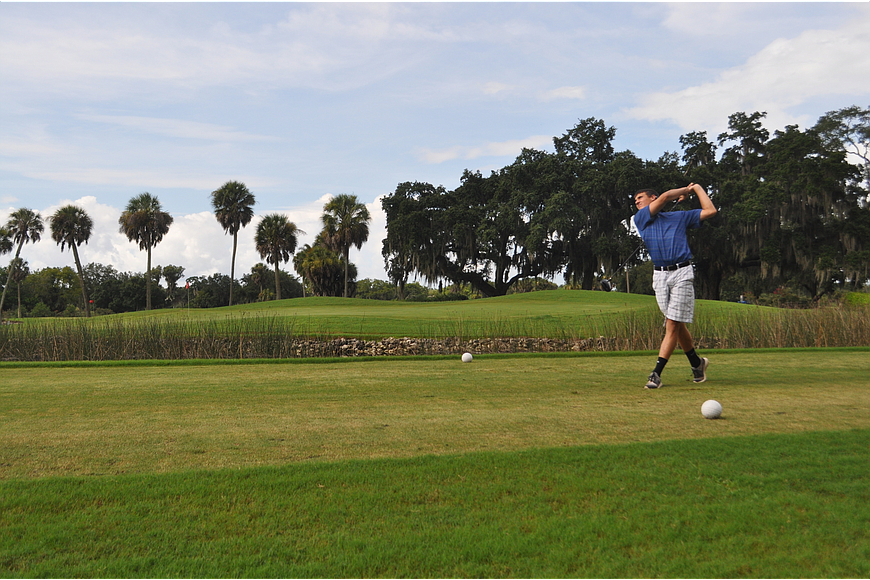- March 16, 2025
-
-
Loading

Loading

In a 3-2 vote Monday, the City Commission elected to pursue a $15 million renovation project at Bobby Jones Golf Club that would shrink the size of the municipal course by nine holes.
The commission also unanimously signaled its interest in maintaining the entirety of the 293-acre city-owned property as public open space. The commission directed staff to prepare a proposal for a conservation partnership that would only allow the property to be used for nature preservation and light recreation.
The city’s favored design for Bobby Jones includes 27 regulation holes and a nine-hole short course. City Manager Tom Barwin anticipated construction would begin in spring 2021, a one-year delay from the date officials originally targeted for the renovation project.
The plans are less expansive than the commission’s previous vision for the facility, which called for the renovation of all 45 holes at a cost of about $18 million. Still, the board declined to heed city administration’s recommendation to downsize Bobby Jones to no more than 27 holes.
In material included with Monday’s meeting agenda, administration advocated for an 18-hole renovation and advised the commission to take “extreme caution” when considering any additional work. The agenda documents express concern about the effect a more ambitious project would have on the city’s finances. It states a 27-hole course “minimizes our risk while maximizing our potential benefit.”
But Commissioner Jen Ahearn-Koch said a consultant’s financial projections suggested a 36-hole plan would be the most cost-effective option for the city. The city hired the National Golf Foundation to produce a business analysis of various configurations for Bobby Jones.
In every scenario the National Golf Foundation examined, the city is projected to lose hundreds of thousands of dollars annually on the course as it pays back the debt associated with a bond issued to fund the project. But the 36-hole design showed the least significant losses in the analysis, resulting in average deficits of about $575,000 annually between fiscal years 2022 and 2028.
“If we are just looking at numbers, [36 holes] is the one that has the best numbers,” Ahearn-Koch said.
Staff at Bobby Jones offered their support for the 36-hole proposal. Manager Sue Martin said having 27 regulation holes would allow the city to close nine holes at a time for repairs as necessary and still maintain a full 18-hole course at all times. Staff said the short course represented a valuable alternative for younger and older golfers, as well as individuals who are new to the sport.
Commissioners Liz Alpert and Willie Shaw also voted in favor of the 36-hole configuration. They said the proposal gave the city the most flexibility as it seeks to revitalize the facility, which has been in a state of disrepair for years, according to staff and outside analysts.
“I think the numbers work out better,” Alpert said.
Commissioners Shelli Freeland Eddie and Hagen Brody, who voted against the selected design, both said they were concerned about the cost of the project. Freeland Eddie asked why the city would build a new short course when the city already has the nine-hole Gillespie Executive Course.
Richard Singer, the director of consultant services for the National Golf Foundation, said renovating the existing Gillespie Course would likely offer minimal cost savings compared to building a new short course. Singer said fixing the drainage and irrigation infrastructure at the Gillespie Course would be an expensive process, but Freeland Eddie was still skeptical the city was picking the most cost-effective option.
“I hope you all are right,” Freeland Eddie said. “I feel like we’re going to be spending more money.”
Brody advocated for a design featuring an 18-hole regulation course and a refurbished Gillespie Course. Because of the expenses associated with all of the renovation proposals, Brody thought the city should reduce the size of the golf course and work to create different recreational options on the site to appeal to a broader segment of the community.
“If we turn a large portion of this space into public park space and create these other amenities … that, to me, is justifiable,” Brody said.
The estimated cost for building 18 regulation holes and a nine-hole short course was $12.6 million, though Brody also thought maintaining the existing Gillespie Course could reduce the expenses. The consultant projected an annual loss of $662,500 under that 27-hole configuration.
The 27-hole projections suggested the city would bring in less revenue than the 36-hole model, but it would also face less significant operating expenses and debt service payments. At an August meeting, Barwin said a more expensive renovation project could pose challenges to the city’s budget if Bobby Jones did not achieve its revenue goals.
In the material included with Monday’s agenda, administration cited “golf trends, economic uncertainty and unforeseen circumstances” as reason to pursue a more conservative project.